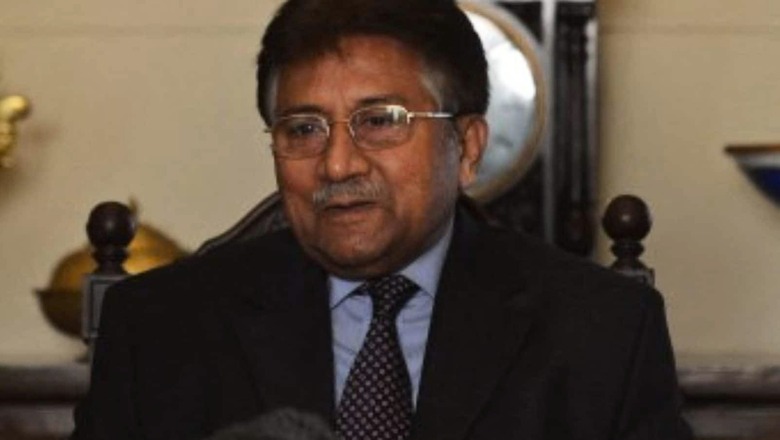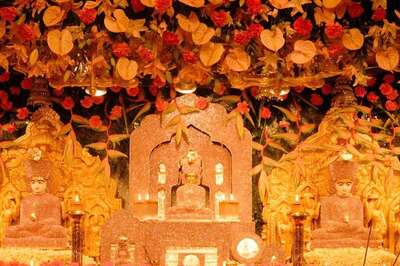
views
The death of Pakistan military dictator, Pervez Musharraf, on Sunday, 5 February, in Dubai has provoked unprecedented comment, even controversy, in India. Musharraf succumbed to a prolonged bout of amyloidosis. The disease is a relatively rare condition in which protein gathers around vital organs damaging them over time. It has been likened to debris gathering around an obstacle, snagging the flow of a river.
Musharraf was the shrewdest and most dangerous of India’s enemies, both as the Pakistani Army Chief and a military dictator. So it is utterly surprising how a large section of Indian influencers, politicians, and intellectuals have hailed him as a proponent of peace. It is another matter that the adventurist who caused the Kargil invasion and war against India did even more damage to his own country, Pakistan.
Musharraf sabotaged the Pakistani democracy by possibly going over then Prime Minister Nawaz Sharif’s head to cause the Kargil occupation. It was a bold move, comparable to Pakistan’s invasion of Kashmir in October 1947. That so-called “tribal” offensive was backed by the Pakistan army. The invaders, who had reached the outskirts of Srinagar, were pushed back to the present “Pakistan Occupied Kashmir” (POK) line of control (LoC), but large parts of Indian territory were lost.
It is another matter that the founder of Pakistan, “Quaid-e-Azam” Mohammad Ali Jinnah, who took over as that country’s first Governor General, died in September 1948, while India’s first war with Pakistan was still underway. A formal ceasefire was declared only on 1 January 1948 and came into effect on 5 January, when it was adopted by the United Nations commission of the Security Council. It was, arguably, among Indian Prime Minister Jawaharlal Nehru’s first “Himalayan blunders” to take matters to the United Nations. He miscalculated the promise of his own stature and charisma or the effectiveness and the justness of India’s cause at the international body. We are still to recover either the loss of our territory or its consequences in Jammu and Kashmir from that miscalculation.
Nehru, however, did not learn his lesson. Kashmir suffered under his direct intervention, with many flip flops with his approach and attitude to the state and its leader, “Sher-e-Kashmir,” Sheikh Abdullah, whose dynasty continued to lead Kashmir. But Nehru’s other Himalayan great Himalayan blunder came towards the end of his life, when China invaded India in 1962, giving us a bloody nose and resulting in the loss of more territory, almost 40,000 sq km of it in Aksai Chin. Another telling contrast, however, when it comes to Pakistan: while Nehru died peacefully in his sleep in May 1964, Pakistan’s first prime minister, Liaquat Ali Khan, was murdered in October 1951.
The man Liaquat Ali Khan appointed to the post of the first Pakistani army commander, Major General Ayub Khan, later ousted the very person, Iskandar Khan, who recommended him to be the president of Pakistan in 1958. That was the beginning of the army coups in Pakistan against elected representatives. Musharraf followed in the footsteps of his Islamist predecessor, Gen Zia-ul-Haq, who grabbed power in 1977. Zia hung Pakistan prime minister Zulfikar Ali Bhutto in 1977 and was himself blown up in a plane crash eleven years later, after ruling Pakistan with an iron hand.
Musharraf ousted Sharif, but did not hang or murder him. He just didn’t let Sharif’s plane land in Pakistan. But later, among other things, Musharraf was accused of being responsible for the assassination of Zulfikar Ali Bhutto’s daughter, Benazir, in 2007 in a suicide attack. Benazir also twice served as the elected prime minister of Pakistan from 1993 to 1996 and 1988 to 1990. There were assassination attempts on Musharraf himself, not to mention his sentencing, in absentia, to death for treason by a Pakistani lower court in 2019.
Musharraf sabotaged the peace process with India several times, despite Atal Bihari Vajpayee’s forgive and forget approach to Kargil. But the nation must be grateful to Vajpayee for recapturing the Kargil heights, even at great cost to us. Quite ironically, the gun that helped us win back our territory was the tainted Bofors Fälthaubits 77, the 155 mm Swedish howitzer, due to which Rajiv Gandhi allegedly lost his prime ministership and Swedish prime minister Olof Palme, his life.
Musharraf, despite all his ups and downs, was a very clever man. He could spin a roomful of intelligent people with his persuasive lies. His diplomatic and military skills were superior to almost any of his contemporaries. He exploited the Americans to fight the Russians by funneling funds and training the Taliban. Now some of the latter have started attacking Pakistan and its armed forces.
Musharraf died an anonymous, if not ignominious, death in a foreign land. That is the fate of dictators. It is foolish, in addition to self-betraying, for us to mourn his passing, let alone falsify his record or glamorise him as an apostle of the Indo-Pakistani peace process. Musharraf was forced to compromise after his Kargil misadventure after his own position in Pakistan, owing to many factors including US pressure, became precarious. Not that he cared for India.
In the end, it is not individuals like Musharraf, but the Pakistan ideology itself that needs to be comprehensively defeated. Unfortunately, both Shahbaz Sharif, the present prime minister and the brother of the man Musharraf betrayed and ousted, as well as Bilawal, the son and grandson of slain prime ministers Benazir and Zulfikar respectively, continue to uphold the anti-Indian Pakistani state and ideology.
That is why in India Musharraf should be remembered as he was — an enemy and aggressor, the champion of the Pakistan policy of bleeding India with a thousand cuts, and an unscrupulous dictator who undermined democracy and became hated in his own land. Though he was born in Delhi and obtained his birth certificate during one of his visits here, he lived and died as one of our staunchest antagonists and combatants.
Read all the Latest Opinions here




















Comments
0 comment